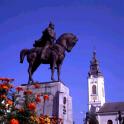 |
| Home Send Money to India Modes of money transfer India BPO India Tourism Taj Mahal Kumarakom Lakes Jaipur Pink city Alappuzha Backwaters Goa Tourism Munnar Hill Station India States Andhra Pradesh Assam Bihar Chattisgarh Goa Gujarat Haryana Himachal Pradesh Jammu and Kashmir Jharkhand Karnataka Kerala Madhya Pradesh Maharashtra Manipur Meghalaya Mizoram Nagaland Punjab Rajasthan Sikkim Tamil Nadu Orissa Tripura Uttar Pradesh Uttaranchal West Bengal India Quick Links Indiaweblinks World Wonders Web 123 Biotech Honeymoon Packages |
India States - Bihar  Bihar is a state of the Indian union situated in the eastern part of the country. Its capital is Patna. Etymologically, the name Bihar derives from the Sanskrit Vihara which means abode. The Buddhist Vihara, which were the abode of the Buddhist monks, dotted the area in the ancient and medieval periods. To Bihar's north is the Kingdom of Nepal. On its other three sides Bihar is surrounded by the Indian states of Uttar Pradesh to the west, Jharkhand to the south and West Bengal to the east. Bihar lies in the very fertile Gangetic plains. Culturally, it is a part of the Hindi heartland of India.
Bihar is a state of the Indian union situated in the eastern part of the country. Its capital is Patna. Etymologically, the name Bihar derives from the Sanskrit Vihara which means abode. The Buddhist Vihara, which were the abode of the Buddhist monks, dotted the area in the ancient and medieval periods. To Bihar's north is the Kingdom of Nepal. On its other three sides Bihar is surrounded by the Indian states of Uttar Pradesh to the west, Jharkhand to the south and West Bengal to the east. Bihar lies in the very fertile Gangetic plains. Culturally, it is a part of the Hindi heartland of India.
 Bihar has a very rich history. It was called Magadha in ancient times. Its capital Patna, then known as Pataliputra, was the center of the Mauryan empire, which dominated the Indian subcontinent between 325 BC-185 BC. Emperor Ashoka was the most famous ruler of this dynasty. Bihar remained an important place of power, culture and education during the next one thousand years. Nalanda and Vikramshila Universities were the world class learning centres. Bihar is also the birthplace of many religions, including Buddhism and Jainism. Buddha attained Enlightenment at Bodh Gaya, a town located in the modern day district of Gaya. Mahavira, the founder of Jainism, was born in Vaishali. The word "Bihar" has its origin in the Sanskrit word Vihara meaning Buddhist Monasteries. At one time these "viharas" were strewn all over the landscape of Bihar, around villages and cities. After his return from South Africa, Mahatma Gandhi started the freedom movement in India by his satyagraha in the Champaran district of Bihar -- against the British, who were forcing the local farmers to plant indigo which was very harmful to the local soil. This movement by Mahatma Gandhi received the spontaneous support of a cross section of people, including Dr. Rajendra Prasad, who ultimately became the first President of India.
Bihar has a very rich history. It was called Magadha in ancient times. Its capital Patna, then known as Pataliputra, was the center of the Mauryan empire, which dominated the Indian subcontinent between 325 BC-185 BC. Emperor Ashoka was the most famous ruler of this dynasty. Bihar remained an important place of power, culture and education during the next one thousand years. Nalanda and Vikramshila Universities were the world class learning centres. Bihar is also the birthplace of many religions, including Buddhism and Jainism. Buddha attained Enlightenment at Bodh Gaya, a town located in the modern day district of Gaya. Mahavira, the founder of Jainism, was born in Vaishali. The word "Bihar" has its origin in the Sanskrit word Vihara meaning Buddhist Monasteries. At one time these "viharas" were strewn all over the landscape of Bihar, around villages and cities. After his return from South Africa, Mahatma Gandhi started the freedom movement in India by his satyagraha in the Champaran district of Bihar -- against the British, who were forcing the local farmers to plant indigo which was very harmful to the local soil. This movement by Mahatma Gandhi received the spontaneous support of a cross section of people, including Dr. Rajendra Prasad, who ultimately became the first President of India.
Geography  Geography Bihar is mainly a vast stretch of very fertile flat land. It has several rivers: Ganga, Son, Bagmati, Kosi, Budhi Gandak, and Falgu to name a few. Central parts of Bihar have some small hills, for example the Rajgir hills. The Himalayan mountains are to the north, in Nepal. To the south is the Chota Nagpur plateau, which was part of Bihar until 2000 but now is part of a separate state called Jharkhand. Climate Bihar is mildly cold in the winter (the lowest temperatures being around 5 to 10 degrees Celsius; 41 to 50 degrees Fahrenheit). Winter months are December and January. It is hot in the summer (40 to 45 degrees Celsius; 104 to 114 degrees Fahrenheit). April, May and the first half of June are the hot months. The monsoon months of June, July, August, and September see good rainfall. October, November, February, and March are very pleasant months for climate.
Geography Bihar is mainly a vast stretch of very fertile flat land. It has several rivers: Ganga, Son, Bagmati, Kosi, Budhi Gandak, and Falgu to name a few. Central parts of Bihar have some small hills, for example the Rajgir hills. The Himalayan mountains are to the north, in Nepal. To the south is the Chota Nagpur plateau, which was part of Bihar until 2000 but now is part of a separate state called Jharkhand. Climate Bihar is mildly cold in the winter (the lowest temperatures being around 5 to 10 degrees Celsius; 41 to 50 degrees Fahrenheit). Winter months are December and January. It is hot in the summer (40 to 45 degrees Celsius; 104 to 114 degrees Fahrenheit). April, May and the first half of June are the hot months. The monsoon months of June, July, August, and September see good rainfall. October, November, February, and March are very pleasant months for climate.
Economy
 Bihar's gross state domestic product for 2004 is estimated at $19 billion in current prices. There was a division of Bihar in 2000, when the industrially advanced and mineral-rich southern-half of the state was carved out to form the separate state of Jharkhand. Since then, the main economic activity of Bihar has been agriculture. The new Bihar state produces about 60% of the output of the old Bihar state. Bihar is among the least developed states of India and has a per capita income of $94 a year against India's average of $255. A total of 42.6% live below the poverty line against India's average of 26.1%. The blame for this stems from many factors: a historical neglect from the center of Indian power (be it Calcutta during the British Empire or Delhi in the independent India), lack of vision of the political classes, and inadequate investments in agriculture, infrastructure and education. Many people in Bihar and in the rest of India also believe that mis-rule, caste-based politics, and rampant corruption by politicians have been the cause of the poverty of the state and its people. Some people have also blamed the absence of a sub-national identity which they claim allowed the Central Government to get away with the neglect even in the post-independence era. The economy is mainly based on agricultural and trading activities. The vast swath of extremely fertile land makes it ideal for agriculture. Despite a number of rivers and good fertile soil, investment in irrigation and other agriculture facilities has been grossly inadequate. Agriculture is mainly dependent upon the vagaries of the nature. Recently the dairy industry has picked up very well in Bihar. There also have been some attempts to industrialize the state: an oil refinery in Barauni, a motor scooter plant at Fatuha, a power plant at Muzaffarpur and some agriculture-based industries such as sugar and vegetable oil. However no sustained effort has been made in this direction, and there is little success in its industrialization.
Bihar's gross state domestic product for 2004 is estimated at $19 billion in current prices. There was a division of Bihar in 2000, when the industrially advanced and mineral-rich southern-half of the state was carved out to form the separate state of Jharkhand. Since then, the main economic activity of Bihar has been agriculture. The new Bihar state produces about 60% of the output of the old Bihar state. Bihar is among the least developed states of India and has a per capita income of $94 a year against India's average of $255. A total of 42.6% live below the poverty line against India's average of 26.1%. The blame for this stems from many factors: a historical neglect from the center of Indian power (be it Calcutta during the British Empire or Delhi in the independent India), lack of vision of the political classes, and inadequate investments in agriculture, infrastructure and education. Many people in Bihar and in the rest of India also believe that mis-rule, caste-based politics, and rampant corruption by politicians have been the cause of the poverty of the state and its people. Some people have also blamed the absence of a sub-national identity which they claim allowed the Central Government to get away with the neglect even in the post-independence era. The economy is mainly based on agricultural and trading activities. The vast swath of extremely fertile land makes it ideal for agriculture. Despite a number of rivers and good fertile soil, investment in irrigation and other agriculture facilities has been grossly inadequate. Agriculture is mainly dependent upon the vagaries of the nature. Recently the dairy industry has picked up very well in Bihar. There also have been some attempts to industrialize the state: an oil refinery in Barauni, a motor scooter plant at Fatuha, a power plant at Muzaffarpur and some agriculture-based industries such as sugar and vegetable oil. However no sustained effort has been made in this direction, and there is little success in its industrialization.
|
|
|
|

